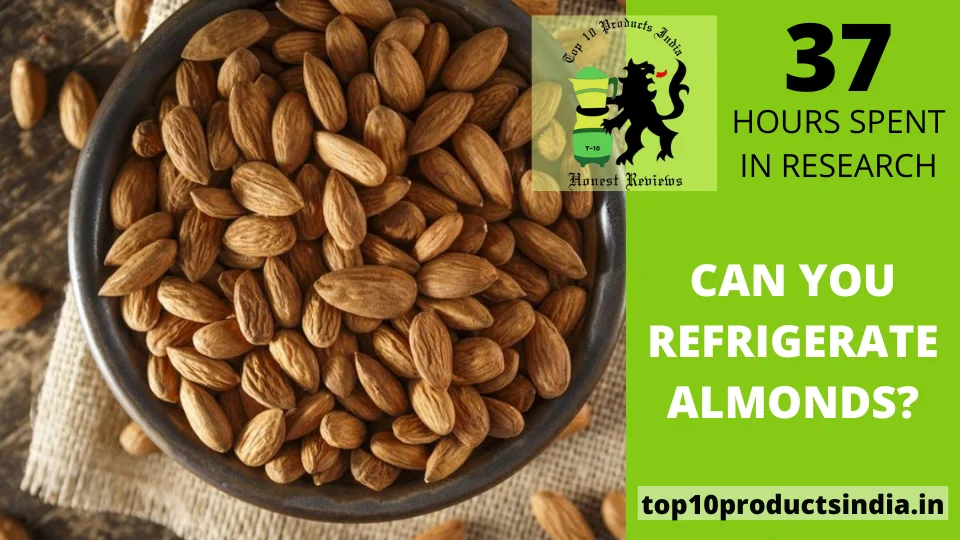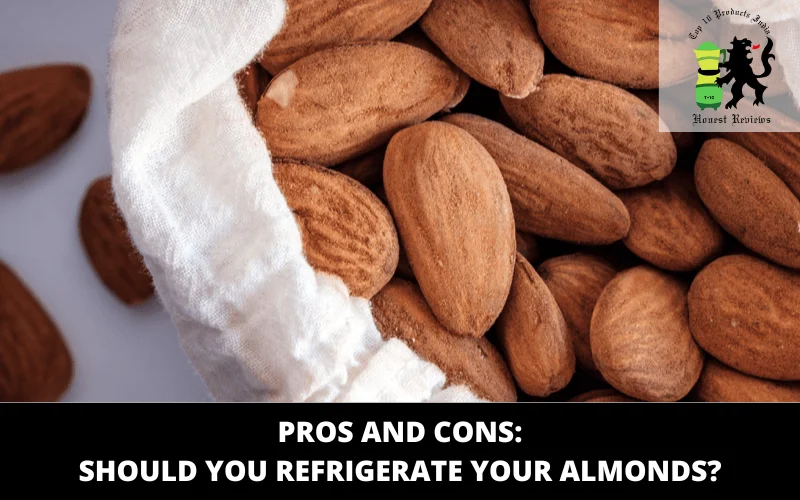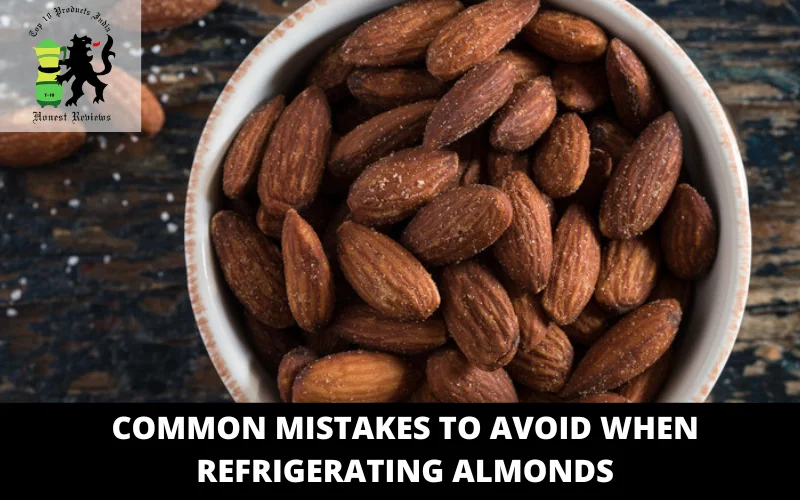Greetings, my fellow audience. Welcome to our blog today. Today, we are going to focus on a question that has been raised by a lot of our audience in the past few days. Here goes the question: can you refrigerate almonds?
So today, we are going to focus on this question. In answer to this question, we will have a big deal of insights and facts that can surely give us an answer so that by the end of this article, we definitely have a concrete answer to the question.
So, we are going to focus on whether it is a good idea to keep almonds in a fridge. It’s not exactly a good idea, but it is something that is actually appropriate to keep almonds in a refrigerator, or should we just keep them there in our pandas as we always do?
So today, we are going to find our answer with a lot of facts that make it up without wasting much of your time. Let’s get into business.
Chillin’ Almonds: Is the Fridge Their Friend?

Of course, we can keep almonds in the fridge. Some experts actually support this idea because it helps keep the almonds fresh and intact with their flavour.
This also helps the almonds to stay in their crispy texture. Keeping them in the fridge can also help us preserve vitamin E in those almonds. When it comes to keeping almonds in the fridge, it’s not just keeping them; there is a way of keeping them.
You should make sure that the container that you are putting them in is airtight so that they don’t absorb moisture or get some odours from other items in the fridge.
Understanding Almond Shelf Life: How Long Can They Last in the Fridge?
Well, this depends on the owner of the almonds, but generally, almonds can spend up to a year in the fridge, and their freshness and flavour still remain intact for such a long period.
And this is not just according to what you want but you have to make sure that they are in a cool and dry place in that fridge. You also should not forget that when you’re putting almonds in the fridge they should be in an airtight container in order to avoid them getting close to some odors that may be found in the fridge concerning other foods.
And those odors can result in almonds getting bad. So in order to keep them fresh, keep them in an airtight container..
Impact of Refrigeration on Almond Flavor and Texture
Of course, they might become a little softer when they are kept in the fridge, and almonds should stay in their crispy texture. While the refrigerators slow down the oxidation process, this results in an extended life, but in exchange, this can lead to the loss of crispness and even flavour in the almond.
When it comes to comparing the two, the almonds that have been in your room might still be crispy than the ones that have been in the fridge, but due to the temperature fluctuation of the fridge, they will not stay crispy for long.
So, it actually depends on your preferences and conditions. If you can consume almonds in a few days, then refrigeration is not needed. But, if you are the one who will take
Is Refrigeration Necessary for All Almond Varieties?
This is also another question that has been raised. All I can say this depends on the owner of the almonds because some as you can know that almonds can be roasted and while you roast almonds you make use of salt and some other ingredients which might make them not favorable to be in the refrigerator.
However, some can also be put in a fridge like that. My advice is to put those fresh almonds in the refrigerator because it helps to slow down the oxidation process and the process of rancidity, which can make them stay in their refrigerator longer.
All in all, we can say that keeping almonds and their refrigerators is the best way to keep them safe and allow them to stay for a little longer.
Pros and Cons: Should You Refrigerate Your Almonds?
When you talk about pros and Cons, these are the advantages and disadvantages of keeping almonds in the fridge.
Pros:
- Inhibits Pest Infestation: Pest infestation is the process by which pests come and eat almonds when they are stored in the household. So, in order to prevent pests from eating the almonds, it is best to keep them in their fridge because pests can’t enter the fridge.
- Potential for Moisture Absorption: A lot of oil just enters the nuts, and this can turn rancid when they are exposed to air and turn into moisture. So when you keep them in the fridge, this reduces and can also prevent this process from happening, and it can also slow down this process.
- Extended Shelf Life: when you talk about extended show of life this is this simply means that when almonds are put in the refrigerator, they can stay longer than when they are in the open or when they are in just a room temperature place, moving on to limited to
Cons:
- Limited Refrigerator Space: Not everyone has a big fridge to keep almonds, and sometimes, concerning the space of your fridge in your room, in order to keep almonds, there won’t be space to keep them, so this can be a disadvantage.
- Loss of Crunch: when you put almonds in the fridge, they become a little softer, which deprives them of their natural crunchiness and their freshness.
- Potential for Moisture Absorption: when this is not handled with the K and when you don’t follow the proper procedures of keeping almonds in the fridge, this might result in them absorbing moisture in the fridge and also getting some orders that can also be due to the foods that are in the fridge there are also some common mistakes that we have to avoid when we are refrigerating almonds.
Common Mistakes to Avoid When Refrigerating Almonds
Keeping them in the fridge for too long, yes we have agreed that they can stay in the fridge for a year, but we should not keep almonds in the fridge for a year because this may result in them being softer and losing their crunchy stirring them near for the strong odours.
This is not, almonds should not be kept close to the food that has strong odors including garlic. The reason behind is that they can contaminate the flavor of the almonds as they can get those odors from those foods.
Almonds that has been in the fridge are also not allowed to come into room temperature before they tell that they are going to be eaten because this is going to make them lose their flavor, their crunchiness, their crispness and their freshness so they should be kept in the fridge till the time that they are wanted to be eaten.
I’m not choosing a heated container when you put almonds in the fridge and The container is not heated, this will result in them absorbing moisture and some odors from other foods in the fridges as well.
This can also result in the almonds losing their free and their crunchiness and their crispness.
Expert Insights: What Nutritionists Say About Refrigerating Almonds
These are the opinions and the ideas of the experts when it comes to nutrients, what they say about keeping almonds in the fridge, the advantages of doing so, and the disadvantages. This is not just their idea; it is also proven by facts.
Experts say that keeping almonds in the fridge is the best way to maintain and keep them fresh and also for them not to lose their nutritional value. As they are needed to be kept fresh, your refrigerator is the safest place where they won’t get the chance to be exposed to heat and oxygen.
In addition, they say that refrigeration can keep the nutrients intact in the almonds. Moreover, refrigeration will also prevent them from degrading in quality.
However, the most important part of putting almonds in the fridge is making sure that they are in an airtight container so that moisture won’t get in and it also helps them not to absorb odors from other foods in the fridge.











